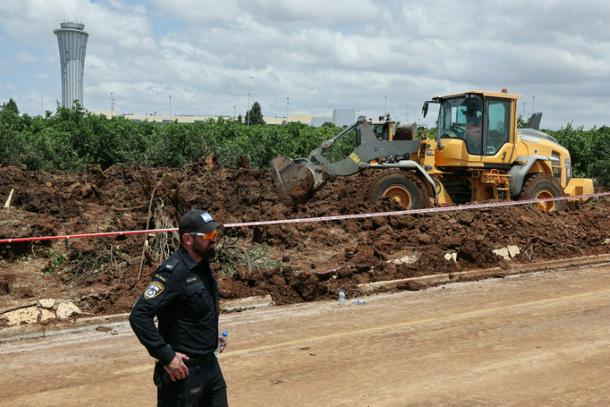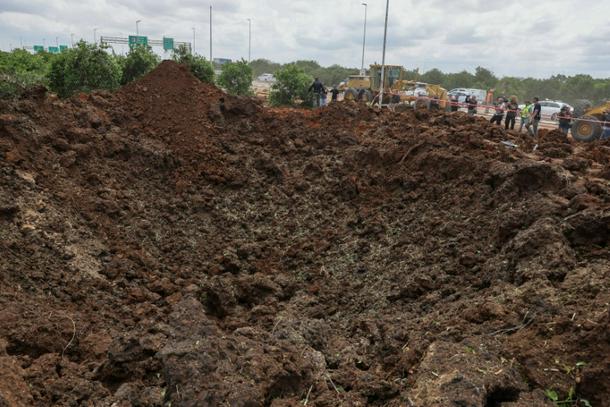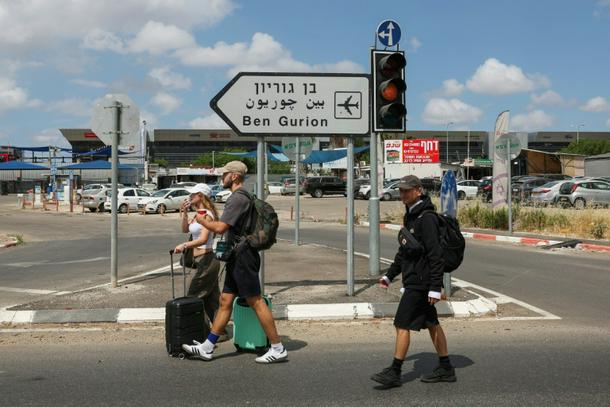
A attack left a wide crater near Ben Gurion airport
Tel Aviv (AFP) - Israeli Prime Minister Benjamin Netanyahu vowed Sunday a response to Yemen’s Huthis and their Iranian backers after the rebels struck the area of Israel’s main airport, wounding six people.
The strike came hours before Israel’s army confirmed the call-up of “tens of thousands” of reservists to expand the 19-month war in Gaza against the Palestinian militants Hamas.
Several international airlines suspended flights to Israel, and hours after the strike Yemen’s Huthis promised more such strikes and warned airlines to cancel their flights to Israeli airports.
The military confirmed that the attack, which gouged a large crater in the perimeter of Tel Aviv’s Ben Gurion Airport, was launched from Yemen and had struck despite “several attempts… to intercept the missile”.

A police video showed officers standing on the edge of a deep hole in the ground
In a video published on Telegram, Netanyahu said Israel had “acted against” the Iran-backed rebels in the past and “will act in the future”.
“It will not happen in one bang, but there will be many bangs,” he added, without elaborating.
Later on X, Netanyahu said Israel would also respond to Iran at “a time and place of our choosing”.
A police video showed officers standing on the edge of a deep hole in the ground with a control tower visible behind them. No damage was reported to airport infrastructure.
An AFP photographer said the missile hit near the parking lots of Terminal 3, the airport’s largest.
- ‘Hit them’ -
“You can see the area just behind us: a crater was formed here, several dozen metres wide and several dozen metres deep,” central Israel’s police chief, Yair Hezroni, said in the video.
“This is the first time” that a missile has directly struck inside the airport perimeter, an Israeli military spokesperson told AFP.

An AFP journalist inside the airport reported a 'loud bang', adding that the 'reverberation was very strong'
The Huthis, who say they act in support of Palestinians in war-ravaged Gaza, claimed responsibility for the attack.
The rebels said their forces “carried out a military operation targeting Ben Gurion airport” with a “hypersonic ballistic missile”.
In a later statement, the group’s military spokesperson Yayha Saree said they would target Israeli airports, “particularly the one in Lod, called Ben Gurion”, near Tel Aviv. He called on airlines to cancel flights to Israeli airports.
Israel’s Magen David Adom emergency service said it had treated at least six people with light to moderate injuries.
An AFP journalist inside the airport during the attack said he heard a “loud bang” at around 9:35 am (0635 GMT), adding that the “reverberation was very strong”.
“Security staff immediately asked hundreds of passengers to take shelter, some in bunkers,” the AFP journalist said.
- ‘Panic’ -
One passenger said the attack, which came shortly after air raid sirens sounded across parts of Israel, caused “panic”.
“It is crazy to say but since October 7 we are used to this,” said the 50-year-old, who did not want to be named, referring to the 2023 Hamas attack on Israel that sparked the Gaza war.
Flights resumed after being halted briefly, with the aviation authority saying Ben Gurion was now “open and operational”.
Soon after a government official said Israel’s security cabinet was to meet on Sunday, army chief Lieutenant General Eyal Zamir confirmed media reports of a planned expansion of the Gaza war.
“This week we are issuing tens of thousands of orders to our reservists to intensify and expand our operation in Gaza,” Zamir said in a statement.
The army would destroy all Hamas infrastructure, “both on the surface and underground”, he added.
The Huthis, who control swathes of Yemen, have launched missiles and drones targeting Israel and Red Sea shipping throughout the Gaza war.
Israel resumed major operations across Gaza on March 18 amid a deadlock over how to proceed with a two-month ceasefire that had largely stopped the war.